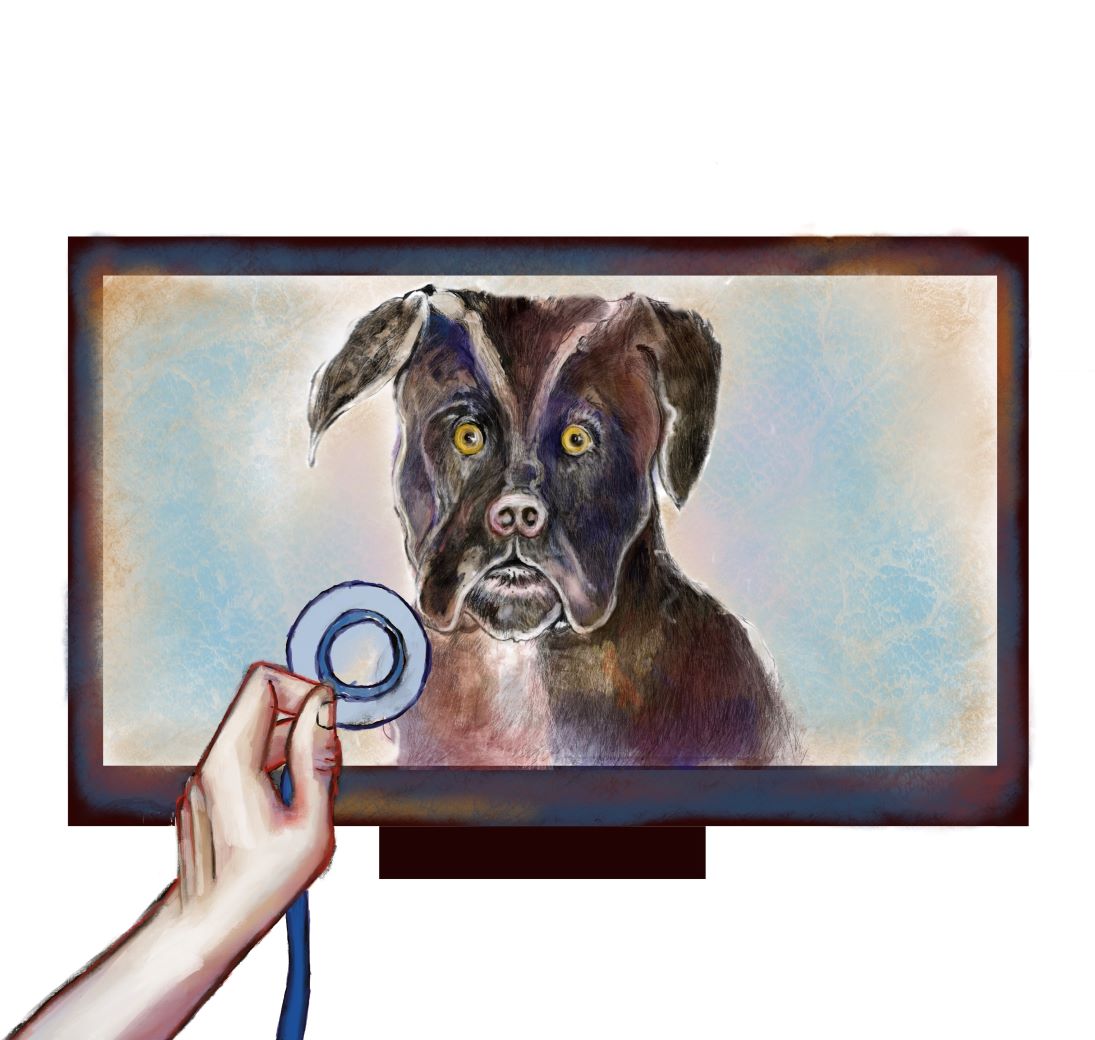Telemedicine dog

Illustration by Jon Williams
When Dr. Joonghwa Lee learned recently that California legislators greenlighted a bill enabling veterinarians to treat animals without having to perform an initial hands-on examination — paving the way for companies such as Walmart and Chewy to offer remote pet care in the state — he shared his frustration with colleagues.
"Of course it passed," the Southern California practitioner lamented on a message board of the Veterinary Information Network, an online community for the profession and parent of the VIN News Service. "Hope all those folks who have been nearsightedly lobbying and supporting it are happy."
AB 1399, which sailed through the state capitol this summer despite heavy opposition from the veterinary establishment, eliminates a requirement that veterinarians examine the patient in person to establish a veterinarian-client-patient relationship. A VCPR must be in place before a doctor may diagnose and treat the patient.
Unless Gov. Gavin Newsom vetoes AB 1399, it will take effect on Jan. 1. The governor has yet to disclose his position on the measure.
VCPR debate evolves across country
Currently, California's rules for creating a VCPR and providing remote care align with those of most other states, which consider a tactile examination crucial to establishing a VCPR because animals cannot verbally communicate their symptoms. Once this relationship is established, a veterinarian can provide remote care.
The prerequisite, however, acts as a barrier to the expansion of telemedicine in veterinary medicine, limiting the entry of new players who see remote-only medicine as a business opportunity. Animal welfare groups also support more veterinary telemedicine offerings as a way to expand access to care. The push for change has challenged the profession in California and beyond.
With the new legislation relaxing the VCPR requirement, California, home to more than 7,000 licensed veterinarians, has taken center stage in a national telemedicine debate. Opinions about the legislation run the gamut from enthusiastic approval to spirited resistance, though many who have voiced their views on VIN are uneasy about the change. A sampling of comments from message board discussions started on Sept. 14 and Sept. 22 is edited for clarity and length.
This is all about selling prescription heartworm, flea and tick medications from online sources. Oh, and Apoquel, Vetoryl, etc. Pet owners who do not go to one of our offices for an annual exam are not currently buying from these on-line providers, so the online providers can now bypass the state requirement of a physical exam prior to obtaining a prescription to purchase these products. That increases their customer base. Just wait for the commercials urging folks to contact them directly for an exam and medication!
Dr. Maureen Dorsey
Oakland, California
Huge blow to the profession! I can understand the welfare groups wanting this, but that falls back on us for not educating the welfare groups on the importance of exams.
I see liability insurance going up on this one. But another way to stop this might be an exclusion in the liability policy when a VCPR is established through telemedicine because there is NO WAY the same standards can be met.
Dr. Dustin Anderson
Pikeville, Kentucky
How are things going to work out with that shortage [of veterinarians] when I decide to stop seeing patients in person, so I can sit on my couch and see them because there is such a great demand?
They aren't alleviating the shortage; they are just putting it somewhere else.
I do understand that telemedicine is going to be part of our profession, and we need to work with it to make it as good as it can be. Some of us never will do it, some of us will quickly embrace it and some of us may find places it really does help people and patients.
Dr. Victoria Bentley
Lockport, New York
Unless telemedicine winds up drastically increasing the efficiency of veterinarians seeing cases or recapturing some doctors who have left clinical practice … there is going to be a loss of veterinary capacity in-person in order to serve the telemedicine market.
This is the situation where you have people lured away from private practice jobs to be paid more per hour with a far more flexible schedule.
For telemedicine to be able to expand, as stated above, there's going to be cannibalization of in-person veterinarians.
Dr. Kevin Jepsen-Grant
Davis, California
I'm not sure anyone thought about how to get a weight for accurate dosing, maybe because humans don't seem to be dosed on weight. Owners are not going to be able to give accurate weights remotely.
It seems to me that the biggest dangers are to the veterinarian who is performing the telemedicine and the pet that is misdiagnosed. [Veterinarians who practice telemedicine] are held to the same professional standards as a veterinarian performing an in-person physical exam. When something goes wrong, the corporation will just put responsibility and liability on the veterinarian, unless they have the sense to just refer everything to a traditional practice.
I think that this ultimately won't work out well when owners have to go to an in-person veterinarian to actually figure out what is wrong with their pets and spend even more money.
Dr. Jennifer Rauch
Atascadero, California
Doing away with an in-person physical exam does a disservice to the animals we swore an oath to heal. I will only be implementing telemedicine after an in-person exam, despite what California says. I practice in California, and I am not going to lower my standards. There is no way you can practice the standard of care we all hold ourselves to by doing exclusive telemedicine exams. (That's not an exam; it is a consult.)
Letters

I graduated in 2020, and all of my large animal rotations were done over Zoom. I learned how to castrate a horse via Zoom. In other words, I didn't learn how to do it. Doing an initial exam over a screen is not acceptable. I catch heart murmurs, ear infections, abdominal tumors and all sorts of issues the owners have no idea are there during routine wellness exams. This will all be lost if our fellow vets decide that a hands-on physical exam is not important anymore. I really worry about antibiotic resistance, too.
This isn't going to go well for the profession, and I worry so many animals are not going to be receiving the high standard of care they deserve.
Dr. Raquel Schenone
Mt. Shasta, California
This is yet again another example of decisions being made by people who do not do the actual work.
Dr. Leslie Sklena
San Luis Obispo, California